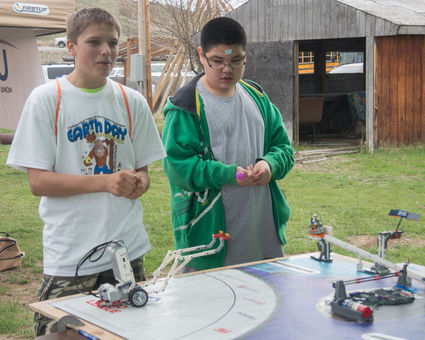From LEGOs to drones
A local look at robotics from the classroom to careers
Last updated 5/1/2019 at 10:06am

From left, teacher Christina Christopherson and Nespelem students Natalie Viera and Luke Yazzie talk with Nathan Moses-Gonzales, who flew his company drones at the tribal Earth Day event. - Jacob Wagner photos
The classic toy LEGO has evolved over the years to incorporate robotics, and students at Nespelem Elementary are using LEGO robots to learn coding and robotics, skills that will be more and more valued in the future.
For Inspiration of Science and Technology, or FIRST, is a global program in which students get hands-on experience with things like LEGO robots.
FIRST Washington partnered with Nespelem Elementary for an after-school program that averages about six to seven kids, four days a week, for fifth- through eighth-grade students.
Christina Christopherson, who teaches sixth- through eighth-grade science at the school, runs the program.
"They get to build and design their own LEGO Robot EV3," Christopherson said. "They write code to program the robot to do the actions they need to do."
Such coding might tell the robot to "pull the drive wheel in, do five rotations, and then turn," Christopherson said.
Education in the STEM (Science, Technology, Engineering, Math) field will be increasingly important as society tries to fill the need for its workers of the future, advocates say, and such clubs can be an important part of that education.
"STEM careers are team sports that require individuals to work together in collaborative environments, develop creative ideas and work with constructive criticism in order to take an idea from the drawing board to reality," said Nathan Moses-Gonzales who runs a company that services agricultural clients with drones.
Christopherson said the students like the program.
"Most of them are here every day," she said. "We're learning to function as a club, and that's important. That's always challenging and interesting. They're learning teamwork and how to work together, how to solve problems, learning computer science and technology, troubleshooting 'why isn't my robot doing what I tell it to do,' so they are understanding the firmware behind it. So they are learning hardware, software, firmware, and just getting the robot to do what they tell it to do."
The Nespelem robotics team, called Eagle Power, entered a competition in Wenatchee earlier this year, where they placed fifth in coding.
Christopherson said they did a project at the competition on how to sustain human life long term in outer space, using "little bumble bee drones" that can pollinate fruit, such as strawberries.
The team also participated in an event in Seattle called the Robotics Cup at the GeekWire Bash, where they won the Space Travelers award for traveling the farthest to participate in the event. The team was also featured in a GeekWire article.
"They definitely want a robot team next year," Christopherson said. "A kid moving to the high school said he wants a team at [Lake Roosevelt]. He wants to keep moving forward with it."
At the Colville Tribes' annual Earth Day Celebration April 19, members of Eagle Power demonstrated their robots in action and talked about how they programmed them to do what they wanted them to do.
Set up next to them was Moses-Gonzales, executive partner and chief executive officer at M3 Consulting Group, a company that uses drones in agriculture in Eastern Washington.
Moses-Gonzales, like many former Nespelem Elementary students, is a member of the Colville Tribes. He has made a career out of robotics and was able to talk about more advanced robotics with the kids at the Earth Day event.
"When I was 6 or 7, my mom got me a small, gas-powered airplane for Christmas," Moses-Gonzales told The Star in an email. "From the first moment that airplane took off, I fell in love with flight and always look back at that moment as the moment that defined my future. You never know what things will capture a child's imagination and inspire them into the future, but for me, it was that airplane. Seeing the young roboticists at Earth Day, and the joy that discovery brought to them, made me happy, and I believe that if our community encourages youth to engage their minds and their talents into robotics, then we are in store for a truly bright future."
"Careers in science and technology are expanding at an incredible rate," Moses-Gonzales continued, "and the sooner students are introduced to robotics, the sooner they can start to build the skills necessary to achieve success in future job markets. It is no secret: automation and robotics will define the future of work. Whether we are aware of it or not, automation and robotics impact our workforce every day, especially in careers that are dull, dirty and dangerous. If we want to see our youth and our communities continue to grow, thrive and succeed, then we need to think ahead and plan for a future where we will increasingly rely on our brains, not our brawn. To this end, robotics clubs present an incredible gateway to careers where programming and critical thinking are not just an asset, but a requirement for employment."




Reader Comments(0)